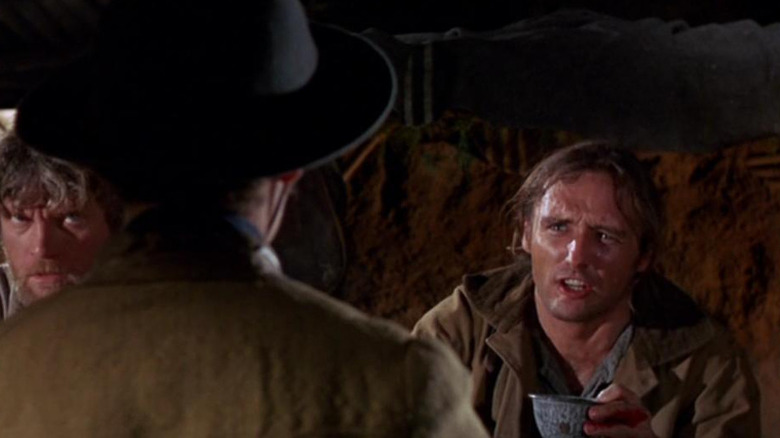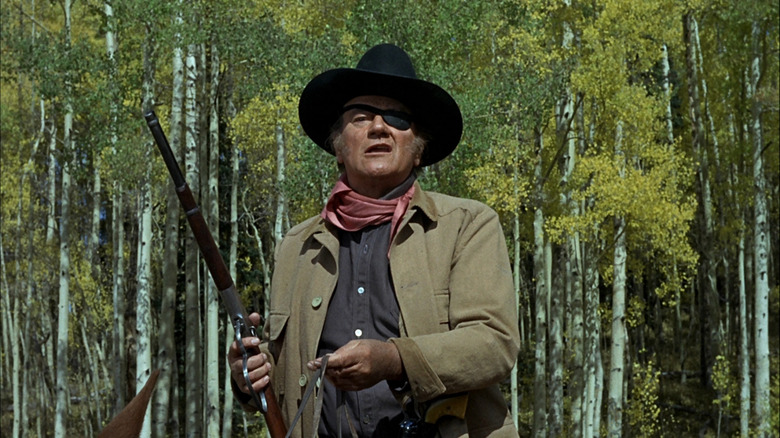John Wayne Broke One Of His Biggest Rules For This Iconic Dennis Hopper Western
If you asked the man himself during his lifetime, John Wayne would have said he had some rigid rules when it came to moviemaking. As he told the BBC (via The Express), anything "mean or petty" was prohibited when it came to the characters he played, even if he did allow his on-screen persona to convey a "rough" or "cruel" aspect from time to time. He also had a rule about his characters shooting a man from behind and even refused to break it for 1976's "The Shootist." But as this last example shows, John Wayne's rules weren't always that hard and fast. That is to say that the Duke had already broken what was seemingly one of his biggest rules in John Sturges' 1974 crime actioner "McQ."
That was far from the first time he'd transgressed a seemingly inflexible personal principle, either. After Wayne was cast in 1969's "True Grit," strict rules were put in place on-set that prevented the cast and crew from bothering the screen legend too much. But the Duke himself wasn't feeling all that obedient while shooting the Western classic, and decided to break a longstanding rule he had for his characters and their use of profanity. Yes, "True Grit" marked the first time audiences heard the great John Wayne let a few swear words fly.
In the film, Wayne's U.S. Marshal Rooster Cogburn comes face to face with Robert Duvall's Ned Pepper and his clan. After telling the outlaw that he means him no harm, Cogburn recoils in disgust when Pepper calls him a "one-eyed fat man," responding with a declaration of war: "Fill your hand, you son of a b***h!" Witnessing such a phrase escape the lips of John Wayne was a significant moment for generations that had grown up with him as the ultimate wholesome hero, and the significance of it wasn't lost on the man himself.
John Wayne felt swearing was appropriate for Rooster Cogburn
John Wayne's Rooster Cogburn had quite a foul mouth in comparison to the actor's other characters. While he spared Dennis Hopper's horse thief Moon from a verbal dressing down before shooting him in the leg, he did at one point recall bidding his ex-wife adieu after she left him for her first husband with the line "Goodbye, Nola, I hope that little nail selling bastard will make you happy this time." During his infamous 1971 Playboy interview, the actor was asked about why he decided to use such "earthy language" in the movie, and explained that in most of his movies, diegetic sound would mask his characters' profanity. "In my other pictures, we've had an explosion or something go off when a bad word was said," he explained. "This time we didn't. It's profanity, all right, but I doubt if there's anybody in the United States who hasn't heard the expression 'son of a b***h' or 'bastard.'"
As Wayne saw it, using that sort of language was appropriate for the character in those moments, especially when it came to his gunfight with Ned Pepper. "We felt it was acceptable in this instance," he continued. "At the emotional high point in that particular picture, I felt it was OK to use it. It would have been pretty hard to say 'you illegitimate sons of so-and-so!'"
At the time the Duke appeared in "True Grit," his career was foundering somewhat, and he'd suddenly found himself on the verge of irrelevancy after decades of being one of cinema's most formidable figures. With "True Grit" he won his first Oscar and regained some prestige, but that wasn't necessarily down to his newfound willingness to embrace profanity or to play more rough-around-the-edges characters. In the aforementioned "McQ," he tried to emulate the more rugged, morally grey style of Clint Eastwood's Harry Callahan from the popular (but controversial) "Dirty Harry" and it just didn't work for him. Still, a couple of fairly innocuous swear words from Wayne certainly helped refresh his on-screen persona in the late-60s, it's just a shame the son of a b***h didn't keep it at that.

